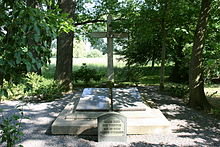Karl von Wrangel
Karl Friedrich Wilhelm Freiherr von Wrangel (born September 28, 1812 in Königsberg , † November 28, 1899 in Sproitz ) was a Prussian infantry general and is an honorary citizen of Flensburg .
Life
origin
He was the son of the later Prussian Lieutenant General August Friedrich Ludwig Freiherr von Wrangel and his wife Karoline Sophie Henriette, née Countess Truchseß von Waldburg (1777-1819).
Military career
Raised in the cadet houses of Culm and Berlin , Wrangel came on 13 August 1830 as a second lieutenant in the 1st Guard Regiment and attended the General War School in Berlin from 1837 to 1840 .
In December 1841, Wrangel had to leave the service because of an honorary trade and - after he had healed from the severe wound he had received - was hired again in March 1843 for the later Emperor Wilhelm I and was assigned to the trigonometric department of the General Staff in Berlin the next year . From here he went, having become Premier Lieutenant in 1846 , with his uncle, Lieutenant General Friedrich von Wrangel , when he had received the supreme command of the German troops destined for the war against Denmark in April 1848 , to the Elbe Duchies , where he became captain of the Schleswig-Holstein General Staff transferred and took part in the campaigns of 1848/49.

Before that he had earned the nickname of the "Drummer von Kolding", which a newspaper enclosed with him. The incident, from which it owes its name, occurred on April 29, 1849 during a street fight in the town of Kolding, which was occupied by the Schleswig-Holsteiners . When these gave way to the advancing Danes, Wrangel brought them to a standstill by tearing the drum from a drum and struck the storm on it.
When Prussia called off its officers in April 1850 , Wrangel became the conductor of the topographical department and did not return to service as a lieutenant colonel until the mobilization in 1859 . Now he took the lead in a Landwehr regiment , which soon after became the Pomeranian Infantry Regiment No. 61 in Stolp .
In the war of 1866 he moved into the field at the head of the 26th Infantry Brigade in Münster and took part in the Main Campaign . In the battles at Dermbach , Kissingen , Laufach , Aschaffenburg , Tauberbischofsheim and Gerchsheim - when used independently - he played an outstanding role and received the order Pour le Mérite for this .
On August 10, 1867, he was appointed commander of the 18th division in Flensburg and promoted to lieutenant general in the spring of 1868 . In the war against France in 1870/71 his division took part in the IX. Army Corps at the battles at Colombey-Nouilly , Mars-la-Tour and Gravelotte-St. Private part. During the siege of Metz , his troops intervened from September 1st during the battle of Noiseville to support the defensive battle of the Prussian I. Army Corps on the east bank of the Moselle . His division excelled at the beginning of December especially when taking Orléans . From there the Commander-in-Chief, Prince Friedrich Karl Nikolaus of Prussia , telegraphed to Versailles : "The honor of the day goes to the Wrangel Division". For this purpose, Wrangel was awarded the Oak Leaves for the Order Pour le Mérite on December 5, 1870 . As the war continued, Wrangel's division was still involved in the capture of Le Mans on January 11, 1871.
After the peace agreement , Wrangel remained at the head of his division in Flensburg until June 1872, when he became governor of Posen . On September 2, 1873 he was given the character of General of the Infantry. With his pension , Wrangel was finally put up for disposal on December 12, 1876 . In recognition of his many years of service, Wilhelm I awarded him the Grand Cross of the Red Eagle Order with Oak Leaves and Swords on September 16, 1881 . He was also a legal knight of the Order of St. John .
family
Wrangel had married Elisabeth Adelheid Ernestine von Strantz on March 26, 1843 (born September 25, 1813 in Berlin, † February 27, 1891 in Sproitz ). From the marriage the daughter Adda (born July 28, 1844 in Charlottenburg; † January 23, 1913) emerged, who on July 29, 1864 in Berlin with Karl Freiherr von Liliencron († 1901), Lord of Sproitz, Chamberlain and Rittmeister a. D. had married. Adda was a founding member and chairwoman of the women's association of the German Colonial Society.
Honors and commemorations
He was made an honorary citizen of Flensburg in 1872. In 1903 a memorial in his memory in Flensburg, consisting of a statue with a base on which a relief with the image of the drummer von Kolding is attached, was unveiled in Flensburg's city park . In addition, a street in Flensburg is named after him (see there ). There is also a Wrangelstrasse in Kiel (see there ).
literature
- Adda von Liliencron : General of the Infantry Baron Karl von Wrangel. A picture of life based on his own records . Gotha 1903.
- Bernhard von Poten : Wrangel, Karl Freiherr von . In: Allgemeine Deutsche Biographie (ADB). Volume 55, Duncker & Humblot, Leipzig 1910, p. 124 f.
- Kurt von Priesdorff : Soldier leadership . Volume 7, Hanseatische Verlagsanstalt Hamburg, undated [Hamburg], undated [1939], DNB 367632829 , pp. 351-354, no. 2340.
Web links
| personal data | |
|---|---|
| SURNAME | Wrangel, Karl von |
| ALTERNATIVE NAMES | Wrangel, Karl Freiherr von; Wrangel, Karl Friedrich Wilhelm Freiherr von |
| BRIEF DESCRIPTION | Prussian general of the infantry |
| DATE OF BIRTH | September 28, 1812 |
| PLACE OF BIRTH | Königsberg (Prussia) |
| DATE OF DEATH | November 28, 1899 |
| Place of death | Sproitz |


